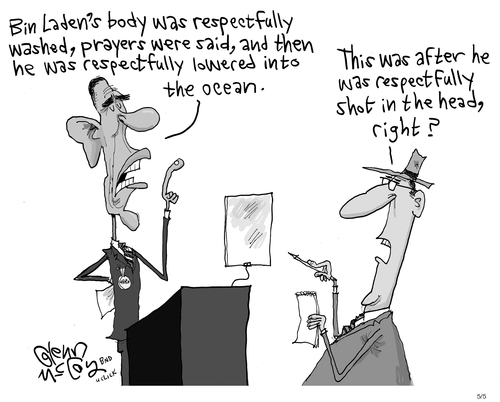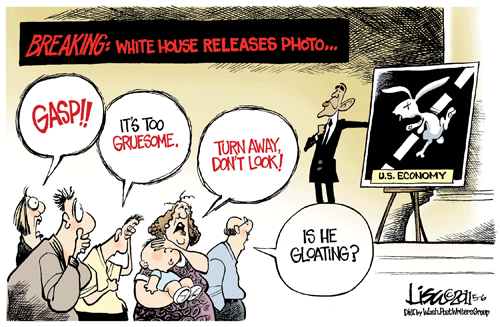“Punting the Pundits” is an Open Thread. It is a selection of editorials and opinions from around the news medium and the internet blogs. The intent is to provide a forum for your reactions and opinions, not just to the opinions presented, but to what ever you find important.
Thanks to ek hornbeck, click on the link and you can access all the past “Punting the Pundits”.
 Glen Greenwald: U.S. Tries to Assassinate US Citizen Anwar al-Awlaki
Glen Greenwald: U.S. Tries to Assassinate US Citizen Anwar al-Awlaki
That Barack Obama has continued the essence of the Bush/Cheney Terrorism architecture was once a provocative proposition but is now so self-evident that few dispute it (watch here as arch-neoconservative David Frum — Richard Perle’s co-author for the supreme 2004 neocon treatise — waxes admiringly about Obama’s Terrorism and foreign policies in the Muslim world and specifically its “continuity” with Bush/Cheney). But one policy where Obama has gone further than Bush/Cheney in terms of unfettered executive authority and radical war powers is the attempt to target American citizens for assassination without a whiff of due process. As The New York Times put it last April:
It is extremely rare, if not unprecedented, for an American to be approved for targeted killing, officials said. A former senior legal official in the administration of George W. Bush said he did not know of any American who was approved for targeted killing under the former president. . . .
That Obama was compiling a hit list of American citizens was first revealed in January of last year when The Washington Post‘s Dana Priest mentioned in passing at the end of a long article that at least four American citizens had been approved for assassinations; several months later, the Obama administration anonymously confirmed to both the NYT and the Post that American-born, U.S. citizen Anwar al-Awlaki was one of the Americans on the hit list.
Ross Douthat: Whose Foreign Policy Is It?
I have never agreed with anything this man has written until now
For those with eyes to see, the daylight between the foreign policies of George W. Bush and Barack Obama has been shrinking ever since the current president took the oath of office. But last week made it official: When the story of America’s post-9/11 wars is written, historians will be obliged to assess the two administrations together, and pass judgment on the Bush-Obama era.
The death of Osama bin Laden, in a raid that operationalized Bush’s famous “dead or alive” dictum, offered the most visible proof of this continuity. But the more important evidence of the Bush-Obama convergence lay elsewhere, in developments from last week that didn’t merit screaming headlines, because they seemed routine rather than remarkable.
One was NATO’s ongoing bombing campaign in Libya, which now barely even pretends to be confined to humanitarian objectives, or to be bound by the letter of the United Nations resolution. Another was Friday’s Predator strike inside Pakistan’s tribal regions, which killed a group of suspected militants while the world’s attention was still fixed on Bin Laden’s final hours. Another was the American missile that just missed killing Anwar al-Awlaki, an American-born cleric who has emerged as a key recruiter for Al Qaeda’s Yemen affiliate.
Imagine, for a moment, that these were George W. Bush’s policies at work.
Paul Ryan claims the protests heard so very loud and clear during the House Budget Committee chair’s town hall meetings in April had no influence on his thinking about Medicare.
Perhaps Ryan really does have a tin ear.
But the outcry over his plan to mess with Medicare, heard in Wisconsin communities from Milton to Kenosha, and at spring recess sessions in the districts of Republican freshmen from Pennsylvania to Florida, obviously influenced other Republicans.
Images from Kenosha – a historic factory town in Ryan’s district, where hundreds of people showed up to criticize his scheming to cut benefits for working Americans while giving billionaires and multinational corporations new tax breaks – were featured nationally on broadcast network news shows.
Cable news programs focused intense attention on the story. MSNBC’s Ed Schultz devoted much of a program last week to the outcry. (In addition to a blistering analysis of the congressman’s proposal by the host, this writer provided some on the ground reporting from Kenosha, including details of a brief interview with Ryan, who was typically dismissive of the popular discomfort with his plan.) But other networks — even Fox — at least touched on the congressman’s troubles.
The reporting was noticed in Washington where, last week, GOP leaders began almost immediately to distance themselves from Ryan’s plan to use Medicare funds to enrich the private insurance firms that have donated so generously to his campaigns.
Stephen L. Goldstein: “Shock Doctrine” Economics Ruining America
WARNING: Reading Naomi Klein’s “Shock Doctrine: The Rise of Disaster Capitalism” will disturb your sleep and haunt your waking hours. If you’re a real American, it will make you want to scream – and do something to put “the bad guys” in their place. Everyone – especially Milton-Friedman, free-market lovers like Kingsley Guy – should read “Shock.” If enough people do so, it could save the country. If they don’t, our democratic/representative government and capitalism will be permanently replaced by the un-American, corporate-socialist state that has already taken hold – and it will be our own fault.
For 50 years, laissez-faire economist Friedman and his apostles at the University of Chicago have spread a doctrine based upon “the elimination of the public sphere, total liberation for corporations and skeletal social spending,” according to Klein. Even worse is how they do it: For Friedman and his minions, widespread disasters (natural and man-made) are opportunities to make money. While victims are really or figuratively bleeding, too shocked to realize what’s happening, in cahoots with lapdog governments, they impose “deregulation, privatization, and cutbacks” on economies as the formula for recovery. Promising prosperity for all, they deliver widespread poverty and oppression.
Brent Blackwelder Obama Should Back Off Risky Nuclear Loan Guarantees
Well before the catastrophe at Fukushima began unfolding, a familiar word was heard in discussions about plans to build a new generation of reactors in this country. That word: risk.
With President Barack Obama and Congress pushing ahead with efforts to offer up federal construction loan guarantees totaling $54.5 billion, what was the risk of taxpayers getting stuck holding the bag in the event these nuclear projects defaulted? And, why should taxpayers even be expected to assume such a risk?
Before those critical questions were satisfactorily addressed, we were sadly reminded of the other definition of risk when it comes to nuclear energy. The toll of Fukushima won’t be known for years, but assuredly the cost, both human and financial, will be huge.
As public debate over nuclear safety once again flares up – with industry’s familiar assurances that “it can’t happen here” – let’s not allow the financial risks inherent in this energy choice to be overlooked.
Michelle Chen; Watchdogs Probe Labor Abuses in China’s Tech Industry
Never underestimate the power of a good public shaming. Western electronics firms were mortified in 2010 by reports of gruesome suicides of young workers in China, employed by the multinational tech giant Foxconn. Since the company runs a network of plants that churn out glistening gadgets for Apple, Dell and Hewlett Packard, the suicides scandalized tech brands that often market themselves as hip and progressive.
The months of damage control that followed led to promises to reform wages and working hours and to establish less Dickensian, more worker-friendly factory conditions. But has all that bad publicity (encapsulated most recently in a sensational theatrical production) paid off for workers?
This week watchdog groups have released a report to kickstart a global campaign to call attention to ongoing labor issues. The “Time to Bite Into a Fair Apple” campaign hopes to keep the pressure on both Chinese authorities and multinational firms to fulfill promises to make the manufacturing system more humane for hundreds of thousands of young Chinese workers.
Allison Kilkenny: NY Teachers Vow ‘Wisconsin-Style’ Protest
New York teachers are vowing to protest in the wake of Mayor Bloomberg’s plan to layoff thousands of educators.
“Mr. Mayor, it’s not going to happen, and enough is enough!” shouted Michael Mulgrew, president of the United Federation of Teachers, as he whipped up a roaring crowd at the UFT’s spring conference in midtown New York.
A ballroom-full of educators rose to their feet, clapping and chanting, “Enough is Enough.”
A surprise guest, Wisconsin State Sen. Jon Erpenbach, the man who led 13 fellow lawmakers out-of-state in order to block Gov. Scott Walker’s anti-union legislation, received a standing ovation from the crowd.
The UFT, along with many other unions, plan to draw tens of thousands of supports for the May 12 march from City Hall and other sites to Wall Street to oppose Bloomberg’s cuts and demand the big banks start paying their fair share.


 On this day in 1973,
On this day in 1973, 
 Welcome to the Stars Hollow Health and Fitness weekly diary. It will publish on Saturday afternoon and be open for discussion about health related issues including diet, exercise, health and health care issues, as well as, tips on what you can do when there is a medical emergency. Also an opportunity to share and exchange your favorite healthy recipes.
Welcome to the Stars Hollow Health and Fitness weekly diary. It will publish on Saturday afternoon and be open for discussion about health related issues including diet, exercise, health and health care issues, as well as, tips on what you can do when there is a medical emergency. Also an opportunity to share and exchange your favorite healthy recipes. 





Recent Comments